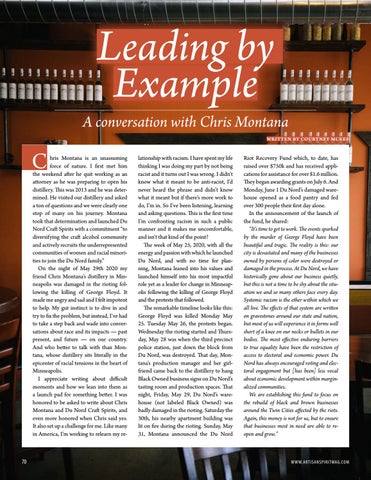Leading by Example
A conversation with Chris Montana WRITTEN BY COURTNEY MCKEE
C
hris Montana is an unassuming force of nature. I first met him the weekend after he quit working as an attorney as he was preparing to open his distillery. This was 2013 and he was determined. He visited our distillery and asked a ton of questions and we were clearly one stop of many on his journey. Montana took that determination and launched Du Nord Craft Spirits with a commitment “to diversifying the craft alcohol community and actively recruits the underrepresented communities of women and racial minorities to join the Du Nord family.” On the night of May 29th 2020 my friend Chris Montana’s distillery in Minneapolis was damaged in the rioting following the killing of George Floyd. It made me angry and sad and I felt impotent to help. My gut instinct is to dive in and try to fix the problem, but instead, I’ve had to take a step back and wade into conversations about race and its impacts — past present, and future — on our country. And who better to talk with than Montana, whose distillery sits literally in the epicenter of racial tensions in the heart of Minneapolis. I appreciate writing about difficult moments and how we lean into them as a launch pad for something better. I was honored to be asked to write about Chris Montana and Du Nord Craft Spirits, and even more honored when Chris said yes. It also set up a challenge for me. Like many in America, I’m working to relearn my re-
70
lationship with racism. I have spent my life thinking I was doing my part by not being racist and it turns out I was wrong. I didn’t know what it meant to be anti-racist, I’d never heard the phrase and didn’t know what it meant but if there’s more work to do, I’m in. So I’ve been listening, learning and asking questions. This is the first time I’m confronting racism in such a public manner and it makes me uncomfortable, and isn’t that kind of the point? The week of May 25, 2020, with all the energy and passion with which he launched Du Nord, and with no time for planning, Montana leaned into his values and launched himself into his most impactful role yet as a leader for change in Minneapolis following the killing of George Floyd and the protests that followed. The remarkable timeline looks like this: George Floyd was killed Monday May 25. Tuesday May 26, the protests began. Wednesday the rioting started and Thursday, May 28 was when the third precinct police station, just down the block from Du Nord, was destroyed. That day, Montana’s production manager and her girlfriend came back to the distillery to hang Black Owned business signs on Du Nord’s tasting room and production spaces. That night, Friday, May 29, Du Nord’s warehouse (not labeled Black Owned) was badly damaged in the rioting. Saturday the 30th, his nearby apartment building was lit on fire during the rioting. Sunday, May 31, Montana announced the Du Nord
Riot Recovery Fund which, to date, has raised over $750k and has received applications for assistance for over $1.6 million. They began awarding grants on July 6. And Monday, June 1 Du Nord’s damaged warehouse opened as a food pantry and fed over 300 people their first day alone. In the announcement of the launch of the fund, he shared: “It’s time to get to work. The events sparked by the murder of George Floyd have been beautiful and tragic. The reality is this: our city is devastated and many of the businesses owned by persons of color were destroyed or damaged in the process. At Du Nord, we have historically gone about our business quietly, but this is not a time to be shy about the situation we and so many others face every day. Systemic racism is the ether within which we all live. The effects of that system are written on gravestones around our state and nation, but most of us will experience it in forms well short of a knee on our necks or bullets in our bodies. The most effective enduring barriers to true equality have been the restriction of access to electoral and economic power. Du Nord has always encouraged voting and electoral engagement but [has been] less vocal about economic development within marginalized communities. We are establishing this fund to focus on the rebuild of black and brown businesses around the Twin Cities affected by the riots. Again, this money is not for us, but to ensure that businesses most in need are able to reopen and grow.”
WWW.ART ISANSPI RI TMAG.CO M
